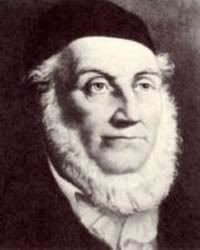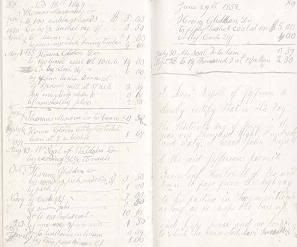Down to business it is. As I mentioned in my previous post, in Munich I bought an old German translation of Shakespeare's King Henry IV Part 1 AND 2 (I noticed later that both were included). I was annoyed to find no mention of when the book was printed.
I could guess that it must be old, at least -ish, judging by the yellowish paper and the ribbon bookmark (those ribbons you only find in Bibles these days), let alone the very-old-and-Gothic-looking font of the German text. Strangely, the English text is in a more modern font.
The translator, August Wilhelm von Schlegel (1767-1845), a poet himself, is still considered one of the best German translators of Shakespeare, according to Wikipedia. Someone else apparently thinks that Schlegel's translation is remarkably different from the original, for example as regards the verse style. Shakespeare often wrote in blank verse, which in his case means he wrote with an unrhymed iambic pentametre. This writer says that Schlegel transformed the blank verse into "the iambic pentametre with either male or female cadence", i.e. 10 or 11 syllables on each line.
Now I'm not very well-versed in these technicalities of poetic composition, but is the iambic pentametre with male or female cadence really so strikingly different from the regular one, which has ten syllables on a line? Anyone care to explain this to me? But be that as it may, I can appreciate the various problems Schlegel must have had, considering how different English and German are when it comes to word order and syllabic structure.

(August Wilhelm von Schlegel)
As for my problem of dating the volume. Schlegel's Shakespeare translations span the years 1797-1810. König Heinrich der Vierte was published in 1800. Obviously there have been reprints, through the 19th century until around the time of WWII. The later reprints, however, all seem to be collections including several plays. But I'm not sure whether that means that they were still printed as individual volumes or as a single book.
Next I tried to find information on the publisher, Der Tempel Verlag. It was founded in 1909, so my book can't be more than almost a hundred years old – not much, eh? Apart from these tiny parsels of information, google really isn't almighty when it comes to finding bibliographical information. I don't mean just old books, but even more recent ones are surprisingly non-existent in the virtual world of search engines. Yet things, or even people, aren't supposed to be important if you can't google them. Fiddlesticks,* I say!
My final resort was the university library's online search engine(s). It's a real drag to go through all sorts of collections on god knows how many different portals, because for each search it takes so long to process. The end result still zilch. I'm slightly disheartened now with my less than resourceful detective skills.
Something good came out of all this though: I stumbled upon a website which has pictures and transcriptions of American diaries from late 19th to early 20th century: www.writtenbyhand.com. Perhaps not eligible for including in a corpus, but interesting nevertheless.

(Picture from Written by Hand Manuscript Americana)
Speaking of corpora, it occurred to me that there might be a possibility of compiling an Edward de Verean corpus for the purposes of comparing his language with Shakespeare's. I definitely need to look into it, since it would make for such an exhilarating research project. I know some websites with transcriptions of his personal letters, draft interrogatories (whatever those are) and memoranda, so all I need to do is find out if they're up for grabs or not.
I do know of one linguistic comparison between these authors, aided by a computer, using statistical methods: Was Oxford Shakespeare? A Computer-aided Analysis. Needless to say, these guys with all their knowledge of statistics still err somewhat in other methodological issues. They assume too much, take so much for granted, and any complexities that don't quite fit are pummeled flat. All in a day's work for anti- or pro-Shakespeareans alike!
*Another Shakespearean term, from no other than 1 Henry IV! Says Falstaff, "Heigh, heigh, the Deuill rides vpon a Fiddlesticke: what's the matter?" Of course, not quite in the same sense as in present-day use.
1 comment:
I've searched for your exampe of King Henry IV.:
The central directory for antiquarian books (www.zvab.com) lists two entries:
One with 277 pages, linen cover, gold vignette at front
It's dated "about 1925"
It seems to be part of a series of 17 books of the works of Shakespeare (12th part).
In the database of the german national library (www.d-nb.de) are a lot of entries. Best fitting should be this (19th part of 21):
http://d-nb.info/36822063X
from this series:
http://d-nb.info/560920539
So finally its dated for 1929!
(but maybe there were reprints of this example)
Post a Comment